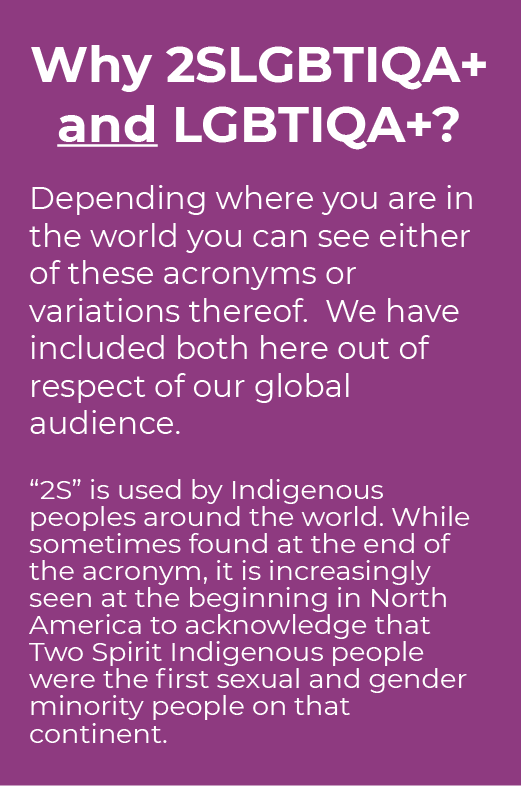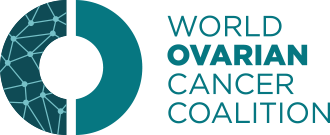Clara MacKay, CEO
In 2021, when the World Ovarian Cancer Coalition surveyed our advocacy partner organizations about what topics they would like to see on the agenda for our inaugural Partner Meeting, 2SLGBTIQA+/LGBTIQA+ inclusiveness was a frontrunner topic.
Many of the organizations that we work with do outstanding work in this area. However, and encouragingly so, there is increased recognition across the Coalition and within the global cancer community of the need to address the lack of diversity of data within cancer science. As well, there is a growing awareness of the need for relevant information, services and support to improve the experience of cancer care for those from the 2SLGBTIQA+/LGBTIQA+ community.
From an ovarian cancer awareness perspective, there are specific messages for the 2SLGBTIQA+/LGBTIQA+ community that need to be communicated. This includes busting myths, like the misconception that having your ovaries removed eliminates the risk of developing ovarian cancer. In addition, within the lesbian and bisexual communities, for example, fewer people take oral contraceptives, give birth, and breastfeed compared to heterosexual women – which are all factors that reduce the risk of developing ovarian cancer.
We also know that issues related to gender dysphoria, discrimination and adverse experiences with healthcare can impact a person’s willingness to trust or access health services.
Combating Barriers Facing 2SLGBTIQA+/LGBTIQA+ Individuals
 Our own work in this area started with a decision to run a 2SLGBTIQA+/LGBTIQA+ focused awareness campaign during June 2022 under the banner of No Person Left Behind.
Our own work in this area started with a decision to run a 2SLGBTIQA+/LGBTIQA+ focused awareness campaign during June 2022 under the banner of No Person Left Behind.
Our first step was to draw on the expertise within our partner organizations and stakeholders from the wider 2SLGBTIQA+/LGBTIQA+community. Noteworthy input came from Stewart O’Callaghan, founder of Live Through This; one of the Coalition’s partner organizations, Ovacome; and Tristan Bilash, a clinical oncology social worker, transgender man, and ovarian cancer survivor.
In 2022, I also participated in a 2SLGBTIQA+/LGBTIQA+ focus group that one of our corporate partners, Teckro, sponsored, hosted by the non-profit organization CISCRP. Here, I listened to members of the 2SLGBTIQA+/LGBTIQA+ community share their experiences with healthcare and clinical trials, and the steps that could be taken to improve these interactions.
The combination of all of these discussions has flagged-up some significant challenges that will take time to address, including:
- Societal biases against the 2SLGBTIQA+/LGBTIQA+ community
- Mistrust by 2SLGBTIQA+/LGBTIQA+ people towards healthcare providers and systems
- Lack of awareness of ovarian cancer and the specific risks for those who are part of the 2SLGBTIQA+/LGBTIQA+ community
- The shocking lack of diversity that exists within cancer research, including clinical trials
- We need to work much, much harder to combat these barriers.
But I was also struck by some of the very simple and foundational ways we can make health services more welcoming and accessible to the 2SLGBTIQA+/LGBTIQA+ community. We need to start with basic healthcare and then expand awareness and accessibility of clinical trials for this community.
Images and Words Matter
When it comes to something as personal as healthcare, people want to see themselves reflected back when they approach awareness information or a healthcare provider who will be privy to the most personal aspects of their lives.
Language is also key. Almost everyone we’ve listened to has shared a personal experience of completing medical forms that only offer male or female as gender options. They are not asked about preferred pronouns, or healthcare providers – either intentionally or unintentionally – use the patient’s “dead name.” (Deadnaming is the act of referring to a transgender or non-binary person by a name they used prior to transitioning, such as their birth name.)
Using the correct names and pronouns are meaningful ways to show respect, as they are wholly entwined with the concept of personal identity. Breaking the ice on this front can be as simple as health professionals sharing their own pronouns.
On a systemic level, it is also important to expand understanding that every person is a unique individual and should be approached as such. One of the most powerful stories we’ve heard is from from Tristan, a transgender man who is also an advanced ovarian cancer survivor. Tristan’s follow-up CA125 test was cancelled because the laboratory software restricted CA125 tests to female patients only. Tristan’s health card, and subsequent lab requisitions, reflect he is legally male so his test was automatically filtered out. Thankfully, this was since corrected and Tristan was able to access this test, but it is an indication of the barriers that can arise when approaching health care.
Everyone Deserves Best Quality of Life and
Chance of Survival
Many starting the journey into 2SLGBTIQA+/LGBTIQA+ inclusivity worry about getting terms wrong or unintentionally offending people. One message that has come through quite clearly in our discussions is that mistakes will happen, and no one will get it right 100% of the time.
What is more important is that the conversations take place – and that they happen in good faith. Sincerity of purpose, genuine and honest dialogue, and being transparent about your limitations in knowledge and experience are the most important steps any person, organization, or company can take as they move towards building trust and a more inclusive future.
We can never truly know what it is like to be in someone else’s shoes, whether they be of a different economic status, live in another country, or identify a different way. As a Coalition, we acknowledge this and celebrate the diversity of our global community. And we are committed to our belief that every person with ovarian cancer deserves the best quality of life and best chance of survival – no matter where they live, who they love, or how they identify.
—
This blog was originally written for, and posted by, Teckro, one of the Coalition’s corporate partners. We have made minor updates to the text for 2023, including the acronyms.
